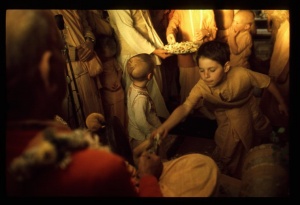CC Adi 17.150 (1975): Difference between revisions
(Vanibot #0027: CCMirror - Mirror CC's 1996 edition to form a basis for 1975) |
(Vanibot #0020: VersionCompareLinker - added a link to the Version Compare feature) |
||
| Line 2: | Line 2: | ||
<div style="float:left">'''[[Sri Caitanya-caritamrta (1975)|Śrī Caitanya-caritāmṛta (1975)]] - [[CC Adi (1975)|Ādi-līlā]] - [[CC Adi 17 (1975)|Chapter 17: The Pastimes of Lord Caitanya Mahāprabhu in His Youth]]'''</div> | <div style="float:left">'''[[Sri Caitanya-caritamrta (1975)|Śrī Caitanya-caritāmṛta (1975)]] - [[CC Adi (1975)|Ādi-līlā]] - [[CC Adi 17 (1975)|Chapter 17: The Pastimes of Lord Caitanya Mahāprabhu in His Youth]]'''</div> | ||
<div style="float:right">[[File:Go-previous.png|link=CC Adi 17.149 (1975)|Ādi-līlā 17.149]] '''[[CC Adi 17.149 (1975)|Ādi-līlā 17.149]] - [[CC Adi 17.151 (1975)|Ādi-līlā 17.151]]''' [[File:Go-next.png|link=CC Adi 17.151 (1975)|Ādi-līlā 17.151]]</div> | <div style="float:right">[[File:Go-previous.png|link=CC Adi 17.149 (1975)|Ādi-līlā 17.149]] '''[[CC Adi 17.149 (1975)|Ādi-līlā 17.149]] - [[CC Adi 17.151 (1975)|Ādi-līlā 17.151]]''' [[File:Go-next.png|link=CC Adi 17.151 (1975)|Ādi-līlā 17.151]]</div> | ||
{{CompareVersions|CC|Adi 17.150|CC 1975|CC 1996}} | |||
{{RandomImage}} | {{RandomImage}} | ||
==== TEXT 150 ==== | ==== TEXT 150 ==== | ||
| Line 25: | Line 24: | ||
<div class="translation"> | <div class="translation"> | ||
"When a nephew is very angry, his maternal uncle is tolerant, and when the maternal uncle commits an offense, the nephew does not take it very seriously." | |||
</div> | </div> | ||
Latest revision as of 16:04, 26 January 2020
Śrī Caitanya-caritāmṛta (1975) - Ādi-līlā - Chapter 17: The Pastimes of Lord Caitanya Mahāprabhu in His Youth

His Divine Grace
A.C. Bhaktivedanta Swami Prabhupada
A.C. Bhaktivedanta Swami Prabhupada
TEXT 150
- bhāgināra krodha māmā avaśya sahaya
- mātulera aparādha bhāginā nā laya
SYNONYMS
bhāgināra—of the nephew; krodha—anger; māmā—maternal uncle; avaśya—certainly; sahaya—tolerates; mātulera—of the maternal uncle; aparādha—offense; bhāginā—the nephew; nā—does not; laya—accept.
TRANSLATION
"When a nephew is very angry, his maternal uncle is tolerant, and when the maternal uncle commits an offense, the nephew does not take it very seriously."